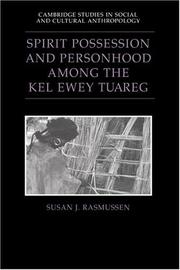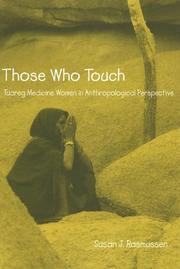| Listing 1 - 2 of 2 |
Sort by
|

ISBN: 0521470072 052102577X 0511521146 Year: 1995 Volume: 94 Publisher: Cambridge : Cambridge university press,
Abstract | Keywords | Export | Availability | Bookmark
 Loading...
Loading...Choose an application
- Reference Manager
- EndNote
- RefWorks (Direct export to RefWorks)
Among the Tuareg people in the Air Mountain region of Niger, women are sometimes possessed by spirits called 'the people of solitude'. The evening curing rituals of the possessed, featuring drumming and song, take place before an audience of young men and women, who joke and flirt as the ritual unfolds. In her analysis of this tolerated but unofficial cult, Susan Rasmussen analyses symbolism and aesthetic values, provides case studies of possessed women, and reviews what local people think about the meaning of possession.
Spirit possession --- Tuaregs --- Women, Tuareg --- Possession par les esprits --- Touaregs --- Femmes touaregs --- Religion --- Religious life --- Vie religieuse --- Religion. --- Religious life. --- #SBIB:39A73 --- #SBIB:39A9 --- -Spirit possession --- -Women, Tuareg --- -Tuareg women --- Possession, Spirit --- Experience (Religion) --- Tuariks --- Berbers --- Ethnology --- Etnografie: Afrika --- Medische antropologie / gezondheid / handicaps --- -Etnografie: Afrika --- Tuareg women --- Social Sciences --- Anthropology

ISBN: 9780875806105 0875806104 Year: 2006 Publisher: DeKalb : Northern Illinois University Press,
Abstract | Keywords | Export | Availability | Bookmark
 Loading...
Loading...Choose an application
- Reference Manager
- EndNote
- RefWorks (Direct export to RefWorks)
"A twenty-five-year veteran of field research in Niger and Mali, anthropologist Susan J. Rasmussen examines the female-dominated practice of herbalism in the seminomadic Muslim communities of Tuareg. Medicine women, known as tinesmegelen, diagnose by touch and treat their patients - mostly women and children - with leaves, bark, and roots from trees associated with ancestral spirits. In addition to healing, they relate oral traditions, offer marital counseling, protect patients against potential domestic violence, and practice divination." "Rasmussen draws the reader into this fascinating world of medicine women through interviews, guided conversations, life histories, illustrative case studies, and, most importantly, the words of the healers and their patients. As a participant-observer, she shares her own experiences with descriptions of the treatments she herself received. Then, moving from a focused analysis to a broader contextual frame, she addresses central questions in anthropology about gender, knowledge, and the interface between religion and medicine."--Résumé de l'éditeur.
Women, Tuareg --- Muslim women --- Women shamans --- Women healers --- Herbs --- Traditional medicine --- Femmes touaregs --- Musulmanes --- Femmes chamanes --- Guérisseuses --- Herbes --- Médecine populaire --- Medicine --- Ethnobotany --- Rites and ceremonies --- Therapeutic use --- Médecine --- Ethnobotanique --- Rites et cérémonies --- Emploi en thérapeutique --- Guérisseuses --- Médecine populaire --- Médecine --- Rites et cérémonies --- Emploi en thérapeutique --- Tuareg women --- Medicine women --- Shamanesses --- Curanderas --- Ethnic medicine --- Ethnomedicine --- Folk medicine --- Home cures --- Home medicine --- Home remedies --- Indigenous medicine --- Medical folklore --- Medicine, Primitive --- Primitive medicine --- Surgery, Primitive --- Islamic women --- Women, Muslim --- Shamans --- Healers --- Women in medicine --- Alternative medicine --- Folklore --- Medical anthropology --- Ethnopharmacology --- Women --- Plants, Useful --- Forbs --- #SBIB:39A9 --- #SBIB:39A10 --- #SBIB:39A73 --- Medische antropologie / gezondheid / handicaps --- Antropologie: religie, riten, magie, hekserij --- Etnografie: Afrika --- Muslimahs
| Listing 1 - 2 of 2 |
Sort by
|

 Search
Search Feedback
Feedback About UniCat
About UniCat  Help
Help News
News